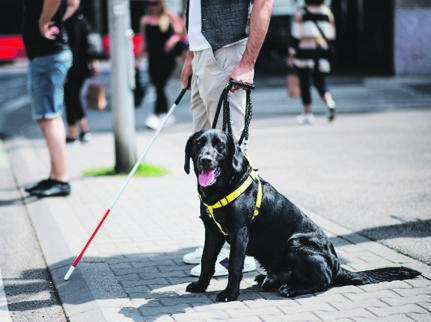
In partnership with The Conversation, #Trending brings you Curious Kids, a series where we ask experts to answer questions from kids.
How do guide dogs know where their owners want to go? – Mia, age 6
Carmel Nottle, lecturer: human movement / clinical exercise physiology, University of South Australia:
“Guide dogs, which are assistance dogs for people who are blind or visually impaired, know where to go because they practise.
As part of its training, a guide dog will practise getting around to some of the most common places the person it will guide needs to go. This may include the shops near their home, or from their home to the bus stop. Guide dogs only know how to get to and from familiar places they have practised the routes for.
What most people don’t realise, though, is that the person the dog is guiding still needs to know where they are going.
There is a lot of training a guide dog will do before it is taught familiar places. Making sure it guides a person safely is much more important than knowing where to go. Say you are walking to school and a branch of a tree has fallen across the path you normally walk on.
If the branch is small, the dog may help safely guide the person around it. If it is a large branch and the dog can’t get around it easily, the dog will block the person so they know there is something in the way.
It is then up to the person to work with their dog to help them safely find a way past the branch. This means a big part of being a guide dog is letting the person know when there is an obstacle in their way.
To a blind person, an obstacle can include things such as the step down the path on to the road, or a step up into a shop – things most of us don’t even think of as an obstacle. People may think a guide dog tells a visually impaired person when they can cross a road. But this is not actually true.
The dog will block the person from stepping on to the road to let them know they have reached the end of the path.
It is then up to the person to listen to their surroundings and decide if it is safe to cross the road. It is the person who tells the dog it is safe to cross the road – not the other way round.”To read more of Nottle’s answer, go to theconversation.com
Talk to us
Hello, curious kids! Have you got a question you’d like an expert to answer?Ask an adult to send it toafrica-curiouskids@theconversation.com. Please tell us your name, age and which city you live in.
 | ||||||||||||||||||||||||||
Get in touchCity Press | ||||||||||||||||||||||||||
| ||||||||||||||||||||||||||
| Rise above the clutter | Choose your news | City Press in your inbox | ||||||||||||||||||||||||||
| City Press is an agenda-setting South African news brand that publishes across platforms. Its flagship print edition is distributed on a Sunday. |




 Publications
Publications
 Partners
Partners








